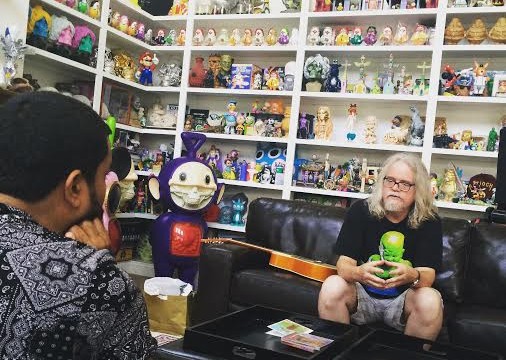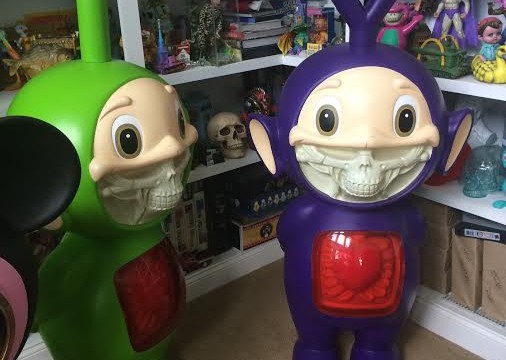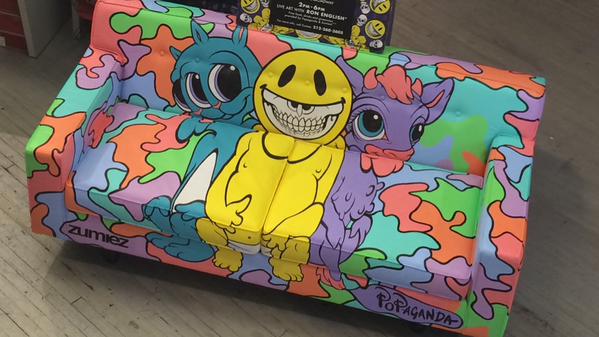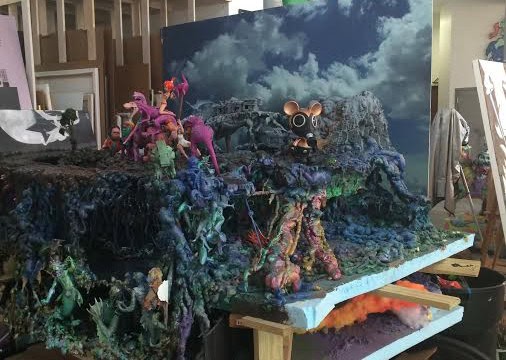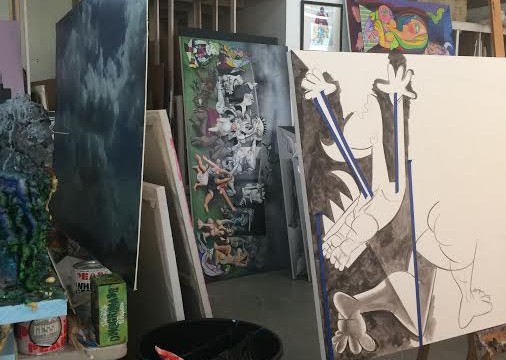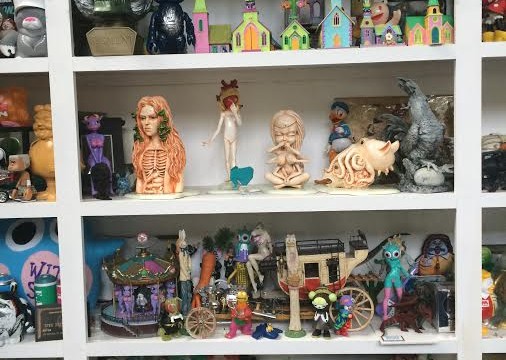And when it comes to art, English has done it all. He’s travelled the world, worked on vinyl toys with guitar legend Slash — partnered with Chris Brown on the infamous Fame album cover, and is currently taking his turn on the legendary Houston Bowery Wall, where the Greats like Keith Haring have painted before him, with his “Temper Tot” mural capturing the attention of all who pass.
His books such as Status Factory show his collection of works commenting on the establishment, poking fun at religion, consumerism, and blind obedience to popular culture. Among his work one will see reinterpretations of familiar characters like Ronald McDonald, otherwise known as MC Super Sized (as seen on the cover of Morgan Spurlock’s Super Size Me documentary) Mickey Mouse, three-eyed rabbits, the Flintstones amid prehistoric Cold Wars, grinning skulls, and much more.
From humble Texas beginnings, English has gone on to experience differences in culture throughout the world and as a result, has become enlightened on the issues seen within media outlets — the inconsistencies and one sidedness that most news sources partake in. In speaking to Ron, it was clear that art may be the only true middle ground – with dialog free from censorship.
After failing art history three times, English began recreating the Masters’works in order channel their insights, eventually putting his own twists on the works of Pablo Picasso and Leonardo Davinci. This became his process. “Picasso danced when he felt a groove,” English mimicked the movements of a child as he channeled the essence of the artist. And with a childlike sparkle in his eye, it was clear that in due time, if not already, artists would soon look to Ron English to find their own process
What was it like working with Chris Brown?
Chris Brown was the first real famous young person I ever hung out with. Iknow older people at that level, like Slash but I’ve never seen people treat him weirdly. He was at my opening and people were like “Hey Slash, what’s up?” but they really didn’t lose it or anything. I guess his fans are older, more reserved you know? With Chris, it was like block after block after block of kids had lined up to get their toys signed– mostly girls. About thirty fans at a time were brought into Toy Tokyo where we were signing, so when they were let into the room where Chris and I were, they got their first glimpse of Chris. As they got closer in line they seemed to be getting more nervous. By the time their turn came up they were hyperventilating, and when they got to Chris they passed out, like one after another. I mean they didn’t even meet Chris, they just fainted and Chris’ crew caught them and took them outside. It must be really weird for people to react to you that way.
Do you follow politics?
Yeah – do you mean like for entertainment, like Donald Trump running?
Do you think the people will vote for Trump?
I think the thing with him is that people know he inherited his wealth. He’s just a privileged guy who made a second fortune. Being able to game the system doesn’t make you a great leader. Different skill set. I think the appeal with Obama was that he wasn’t from upper class and that he made his way up for a large part on his own volition. He was into the idea of community, he knew what people were really up against. There are problems that the elites are just not conscious of. Because they’re not exposed to it. Its just something on paper. There is no emotion or connectedness to that problem.The population is just something to exploit.
When you were making those billboards, did you feel they were important? Did you feel that it was your political voice?
Not at first. At first I just wanted to do it. I thought if everyone dissipated from the planet, I would still paint billboards. I just loved painting big, it was like freedom. Later when I went to graduate school, my roommates were all political activists. They knew I was taking over all these billboards with my art which they thought was pretty cool, but they also thought there should be some higher purpose. Some of them were in Earth First so I added their agenda to my billboards. It was a powerful thing. I didn’t feel like a criminal anymore. I felt like the opposite of a criminal.
I think what you did was extremely important for opening people’s eyes to advertising and how it influences their lives, interests, and concerns. What purpose does art serve to you?
Art is very cathartic. But the part that people don’t play around with is what do you do with the art? And where do you put the art , how does the art get used? I suppose you either go into advertising or you make art for galleries. Product. But you know art can be a lot more than that. When I was in college I would stay up all night painting with these three artists. They were as obsessed with art as much as me. So I put one of the artists in a show, and the paintings, they’re these primitive paintings of these horrifying scenes, these women being split up the side and these weird babies coming out of them. People were mortified. They wanted this misogynistic asshole tossed out of the show. I explained that the artist was actually a woman who was a nurse who dealt with births gone terribly wrong, you know, like the baby is born without a ribcage. These paintings were probably her therapy. Then people liked them. They thought they were important, and they were because they were cathartic for her and for others. Art also works pretty well for selling products.
People buy the artist and not the art.
If I showed you a painting you might think it’s pretty cool. You’d probably think that same painting was a great if I told you Picasso painted it. If you buy stock in a company the actual certificate probably looks about the same as a stock share from another company. But the value isn’t measured by the esthetic appeal of that piece of paper, it’s connected to the importance of the larger organization. A work of art may have a certain visual appeal independent of the historic importance of the artist but the monetary value is more associated with the stature of the artist. Collectors really are buying stock in the artist, the certificate just happens to look better on the wall.
What can people take away from the work of Ron English?
I think artists have a lot of power. And I don’t think they realize how much power they have. If you look at a lot of other countries, like in Iran, that one artist Farghadani, she received a twelve year sentence for making fun of the Parliament in Iran. Why would they punish her so harshly unless there was power in her work? I’m not saying that artists are obligated to be political,but if they should choose to use their talents in that way, well, more power to them.
What made you choose Billboard locations?
When I was putting art on billboards, you know, when I was using billboards to showcase my art — I went to poor neighborhoods — where I thought art wasn’t a part of their life. Like my neighborhood where there was barely any art, I would go to those kind of places — but then when my art got more political — I went to the most visible billboards.
What do you believe were the contributions of having your art in those areas that did not have them before?
Art makes you smarter.
How so?
It just does.
Even when they first came out with computers, they were trying to find people who were capable of working with the new technology, and because it was such a new thing, people could not yet intuitively figure it out, because they had a regimented way of approaching everything; But when they tried recruiting artists they discover the artists adapted very well. They are more intuitive.
The first test I ever got in art school was this puzzle: ok, you’re in this room — with all concrete and no doors or windows — and there’s a lead pipesticking up 20 inches out of the concrete in the middle of the room. A ping pong ball that just barely fits into the pipe has been put into the pipe and has slid down to the bottom. Your task is to remove that ping pong ball. You are given four items to assist you: a box of corn flakes, a hammer, a box knife and a magnifying glass. How do you remove the ball? All the art students are coming up with scenarios, you know, maybe you cut the box holding the cereal, flatten it, then curl it and jam it into the pipe? No matter what they come up with the teacher says no, won’t work. Then he looks at me, “you’re not saying anything Ron, how would you solve the problem?” I said, “I would use the box knife to slit my wrists and let my blood fill the pipe. The ball would float out.” Then everyone got quiet and stared at me. I was wishing I’d never opened my mouth. Then the teacher said, “wow, that would work. The answer was that you urinate into the pipe, but that would work too.” The point of the test was that the only way to solve the problem was by doing something a person would be uncomfortable proposing to a group, or an idea you would be too self-conscious to have in the first place. So if you’re going to be an artist, you can’t have restrictions on your thought process. You’re going to have to be a free thinker.
As such a free thinker, how do you think the artists will use the internet for their own creations in asking why?
Well, I think if we don’t pay attention — and fight for the internet — the internet won’t be anything more than a corporate tool. But I think if we fight for the internet, it will be the greatest form of democracy the world has ever known. Its a leveler. It gives everybody a fair chance. And when something is that powerful, people tend to want to own it, and chop it up. And when something is that powerful, people, and their companies, tend to want to own it all….
The way things tend to work, like with giving permits for billboards, you know, originally the deal with the billboard companies was that 15 percent of them needed to be public service announcements. If we are going to let you put these eyesores up, then you need to give something back. So at first the billboard companies complied, you know, 15 percent of billboards were PSAs. Then they start putting the PSAs in obscure places, low traffic areas. Later they pretty much dropped the idea. Nobody remembers. Like the public airways, companies think they own them. They don’t. They’re a public trust. I mean you can’t just have one self-serving corporation dominating our collective forum.
You think that’s happening right now?
Yes, the rules against media consolidation were relaxed in the 1990’s, the telecommunications act, and more so in the passing years. So a media company is probably going to share a political agenda with their partners in government, the republicans, who got the laws fixed for them. So if you want to rent a billboard to express some more liberal idea, well, they aren’t going for that. I mean it’s not censorship because it’s not the government, it’s a private company that happens to own all the billboards. So I constantly try to do things the right way, but if I get a no, “no that is not going on one of our billboards for any amount of money” well then, good, I’ll give it to you for free. I’m just going to do it. They know that but they don’t come after me. I mean I’m not Banksy you know, I’m in the phone book. It’s not in their interest. Do they really need to put a spotlight on the fact that they control the content on their media outlets in service of a narrow political agenda?
What outlets do you go to get your information?
Fox News when I want to get up to speed on the current ”fauxlosopy”. Outside of that books are great. Long form articles, real people, real places, real life.
– Hurtjohn
